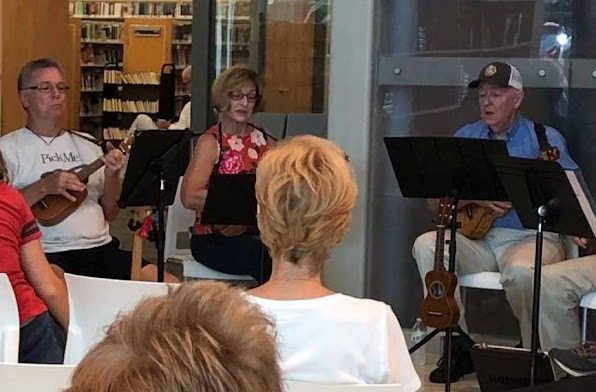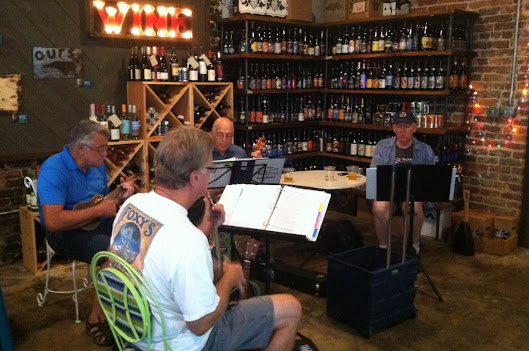High tech networking, low tech gear
It started with an email from a stranger.
With that unexpected message, my grateful acceptance, and later exchanges with Deborah and the on-site librarians, the Raleigh Uke Jam became part of the Triangle’s performing arts community.
More or less. We had our three weeks in the spotlight thanks to the 21st century technologies many, left and right, want to suppress with regulations.
Here’s a contrary, personal take on how social media enabled us to build a bridge that otherwise couldn’t have been constructed.
I circulated the invitation to a handful of people on our email list (which comprised about 70 at the time), choosing several players I thought would work well with minimal rehearsing in a small ensemble. Deborah asked me to mix some narrative history with the music — try to keep me from talking about history — and pull together a 60-minute program.
I set up a playlist, emphasizing the versatility of the instrument and the times it was prominent in popular culture. (NOTE: “Tiptoe Through the Tulips” was nowhere to be found.) Yes, there’s a song explaining why ukuleles aren’t allowed in bluegrass.
We played three dates in September.
George Douglas, a member of our host church, and the host of a monthly Renaissance-era program on WCPE radio (theclassicalstation.org; a fine outfit worth its own treatment here), joined me for the three performances. Ivan Browning, a uke fanatic who teaches ukulele and tech stuff to senior groups in Cary, was with us for the first two. (George and Ivan are excellent harmonica players, which added virtuosity and fun to the performances.) Several others, including uke jam founders David Simpson and Rick Higgens, joined George and me for the last one.
It was a blast. The audiences ranged from a dozen or so to nearly 20. We found a few recruits among the listeners.
Sadly, COVID-19 prevented us from reaching out to other groups. Maybe it’ll happen.
High tech enabling low tech
We had performed publicly before. The monthly gigs at Pelagic Beer and Wine. Over two summers, we played at the downtown Raleigh Night Market. (It grew too large for us to navigate; we were a victim of its success!) Also thanks to Pelagic, the Marble Kids Museum asked us to play a set to celebrate the debut of an IMAX movie about traditional American music.
But social media made this “tour” possible.
Deborah learned of the uke jam from our Facebook page. She and her colleagues needed “content” for their programs. We used email to communicate.
I pulled together the players and playlist electronically. Emails to the players, a setlist posted on Dropbox, downloaded to tablets. George and Ivan and I “rehearsed” once. Virtually. Using a rickety Skype connection. (None of us had a clue how quickly video chat technology would become essential and routine.)
Billions of pixels flowing over magical networks helped a few people spread an hour of joy to a few more people, relying on instruments that were developed by a group of Portuguese woodworkers more than a century ago.
Social media and Big Tech may be in the crosshairs of progressives and conservatives alike. Using government to censor communications along private networks would violate the spirit and letter of the First Amendment and stifle social interactions generally. I offered a longer take here.
The experience of our little group has been undeniably positive. The Raleigh Uke Jam started with a Meetup ad. From there, a sporadically updated blog gave way to a robust Facebook page, a YouTube channel, and a fledgling Instagram feed. The area’s wonderful traditional music nonprofit PineCone has listed our jams on its events calendar. Our email list has grown to almost 100 people — far more than our space at the Church of the Nativity could accommodate.
As I wrote in March, Zoom let us keep the group going even though we couldn’t meet face-to-face indoors.
To be sure, anecdotes are just that. There are plenty of downsides to the explosion of social media. Pollsters at Pew Research Center last year found people who got their news mainly from social media sites tend to pay less attention to what’s going on around them and tend to know less about it.
This may explain why conspiracy theories about the 2020 election or the dangers of COVID or the efficacy of vaccines remain impossible to debunk. They’re spread by people motivated to inflame the passions of information consumers who lack the time (or desire?) to fact-check their sources.
The risks to our social and civic health are obvious.
The good news is, few people are extremely online. The Pew folks found only 18% of U.S. adults get their news mainly from social media. These folks punch above their weight. But they’re not some indomitable force.
We’re also learning that amid the suffering COVID caused, the ubiquity of social media probably forestalled even worse damage to physical and mental health.
In March 2020, as we began to realize the pandemic would wreak large-scale havoc, the National Interest published this prescient outlook from communitarian sociologist Amiai Etzioni. “The much-maligned social media realm can help people avoid the detrimental effects of social isolation during this pandemic.”
The then-91-year-old Etzioni noted how using technology to connect with friends and loved ones could ease some of the pressures of lockdowns — and that elderly people who were connected online felt much less isolated than those who weren’t.*
He noted a phenomenon in Italy.
“Inventive Italians add another touch: isolated in their homes, they are getting together on their porches — to sing. In short, people confined to their homes can reach out to others and improve their psychological condition.”
Similar situations were emulated worldwide. New Yorkers got plenty of airtime with their daily round of applause to health care workers treating COVID patients as they ended shifts at hospitals.
Too much of a good thing?
The worst thing I can say about the uke jam’s social media experience is that it may have given us more exposure than we could handle. In 2018 and 2019, we had to turn down repeated offers to play at neighborhood farmer’s markets, craft fairs, and other public events. The pay was too low (aka nonexistent). The logistics took up too much time.
For now, we’ll gladly play at senior centers and schools and nonprofits supporting good causes. Individual group members do as much as they want, to be sure. And we’ll keep showing up for our friends at Pelagic, who gave us the first chance to play regularly for other people. (We return June 29, 7 p.m. Be there. Aloha!)
*Humblebrag: My great-niece Genavee Brown, a lecturer at Northumbria University in Newcastle, U.K., studies “the benefits and risks of technology for relationships from a social psychology perspective.” She’s published several academic papers on the ways devices can disrupt face-to-face personal relationships even as social networking can build bonds when people aren’t able to be in the same physical space. I expect she’ll be a resource (or I’ll harass her mom and dad … )




Comments